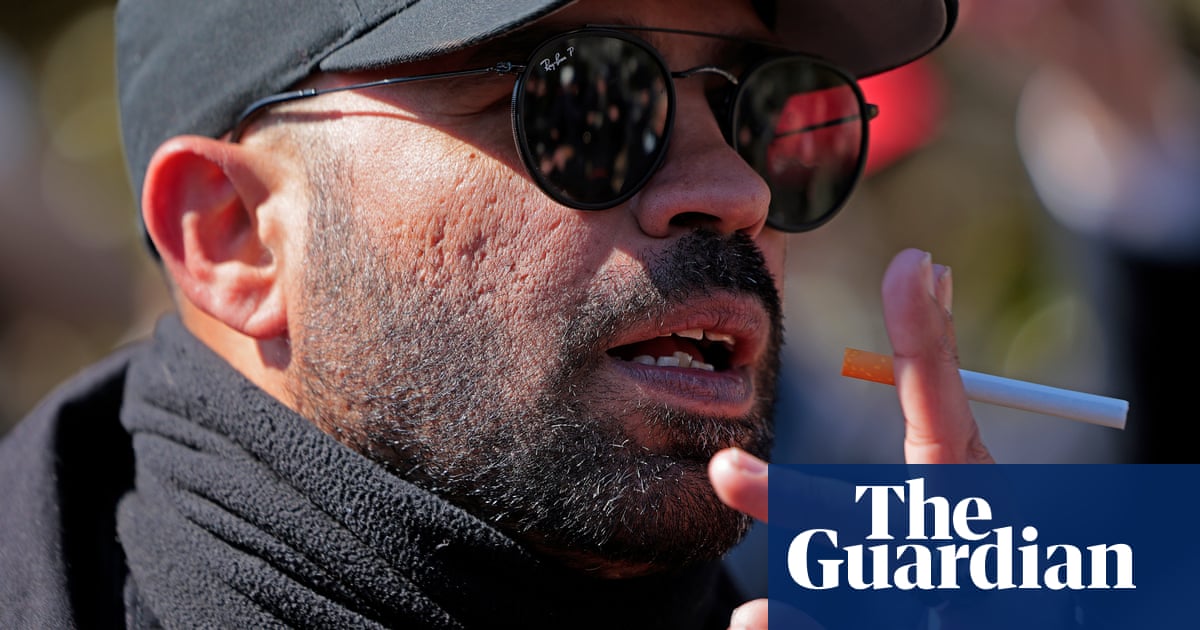Enrique Tarrio, the former national leader of the far-right Proud Boys group, and four other members convicted of orchestrating the deadly 6 January 2021US Capitol attackare suing the federal government for allegedly violating their rights.
Alawsuit filed on Fridayin federal court in Florida alleges that FBI agents and prosecutors acted with personal malice when they investigated and charged the five, who were allgranted pardons or commutationswhen Donald Trump returned to office in January.
Tarrio and fellow plaintiffs Zachary Rehl, Ethan Nordean, Joseph Biggs and Dominic Pezzola are seeking unspecified compensatory damages, plus $100m each in punitive damages, according to the lawsuit filed in US district court in Orlando.
Tarrio received a22-year prison sentencein September 2023 for his part in organizing the attack, even though he was not present when Trump’s supporters overran the Capitol building bent on keeping him in power after his defeat to Joe Biden in the 2020 presidential election.
Nordean, Biggs and Rehl were convicted of seditious conspiracy after the same trial – which lasted almost four months – and given lengthy prison terms. Pezzola was acquitted of seditious conspiracy but handed a 10-year sentence for convictions including destruction of government property.
All four, along with 10 others, had theirsentences commutedfollowing Trump’s sweeping action in January that also granted full and unconditional pardons for about 1,500 people involved in the violence, which was linked to several deaths and the injuries of about140 law enforcement officers.
Trump’s order referred to the Capitol attack convicts as “hostages” and stated: “This proclamation ends a grave national injustice that has been perpetrated upon the American people over the last four years and begins a process of national reconciliation.”
According to the Wall Street Journal (WSJ), whichreported the lawsuit developmenton Friday, the plaintiffs claim the government lacked probable cause to raid their homes after they turned themselves in in connection with their indictments – and that FBI employees reviewed privileged communications with their attorneys.
“Through the use of evidence tampering, witness intimidation, violations of attorney-client privilege, and placing spies to report on trial strategy, the government got its fondest wish of imprisoning the [January 6] defendants, the modern equivalent of placing one’s enemies’ heads on a spike outside the town wall as a warning to any who would think to challenge the status quo,” the lawsuit states.
The document also complains that the men were poorly treated during their time in detention, held for an extended pre-trial period without bond, and held in solitary confinement without cause.
“The plaintiffs themselves did not obstruct the proceedings at the Capitol, destroy government property, resist arrest, conspire to impede the police, or participate in civil disorder, nor did they plan for or order anyone else to do so,” the lawsuit continues, contesting evidence presented by prosecutors at their trial.
“Rather, mere statements of approval, agreement, and enthusiasm are apparently enough to form a criminal conspiracy, provided the points of view are offensive enough to employees of the Federal Bureau of Investigation and the Department of Justice, no matter how attenuated from criminal action they may have been.”
Neither the FBI nor the justice department immediately responded to requests for comment. Both are now controlled by close Trump allies: Kash Patel, the FBI director, and Pam Bondi, the attorney general.
Tarrio wasarrested in Washington DCwithin a month of his release for allegedly striking a woman who was protesting against a gathering attended by Proud Boys members that received pardons.
Two days later, he was captured in a video taken in the lobby of a Washington hotelharanguing officerswho were injured during the insurrection as they attended a conference.
In May, it was reported that the Trump administration had reached a$5m wrongful death settlementwith the family of Ashli Babbitt, a Trump supporter who was fatally shot by a police officer as she attempted to break through a door into the speaker’s lobby at the Capitol while participating in the attack.
Tarrio, from Miami, told the WSJ in an interview on Friday that he believed the legal environment had changed since Trump’s re-election.
He said he had finally been able to find a law firm to take his compensation case after failing to find lawyers in Florida to represent him in legal action against social media companies and banks he said had “deplatformed” people for their political beliefs.
